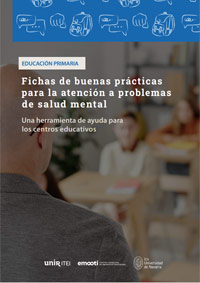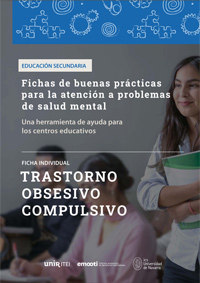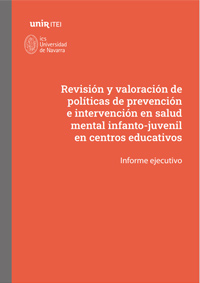Prevention and intervention in child and adolescent mental health in educational centers
Study on internships in Spain, United Kingdom and the United States
According to the World Health Organization (2021), epidemiological data show that one in seven young people aged 10 to 19 suffers from some mental disorder, with depression, anxiety and behavioral disorders being the main causes of illness. Suicide has become the fourth leading cause of death among young people aged 15-29. Most cases go undetected or untreated and extend into adulthood. In addition, in recent years, the prevalence of emotional distress and mental disorders has increased among children and adolescents.
The promotion of emotional well-being and the prevention of mental disorders and their consequences are some of the main objectives in public health. A school provides an ideal environment for prevention, as well as the identification and care for children and adolescents at risk of emotional distress and different mental health problems (WHO, 2013).
There is multiple evidence of prevention programs on emotional wellbeing and mental health intervention already applied in international educational contexts, although less so in the Spanish context. However, these are still strategies that need further review of their long-term effectiveness and should be accompanied by a structural change in the understanding of the system, its potential for intervention, and the necessary training of teachers. .
The project aims to find out how the promotion, prevention and intervention in mental health disorders are being addressed in the school context, with children and adolescents, focusing on the context of Spain, the United Kingdom and the United States.
![]()
To make proposals for improvement or good practices for prevention and intervention in emotional well-being and mental health for schools in Spain, the United Kingdom and the United States.
![]()
Adjust these proposals to the particular legal and cultural context of each country (Spain, United Kingdom and United States).
1
To review the main existing indications or proposals to intervene in emotional well-being and mental health problems in the educational context.
2
To find out which programs or strategies for the prevention of mental health disorders are implemented in schools in the three countries mentioned.
3
To know what forms of intervention in mental health disorders are applied in schools or to what other devices or centers they are referred and how this process takes place.
4
Carry out a critical analysis of the three previous elements, also relying on the advice of experts in the educational and legal fields.
Reports
Technical and executive reports that include the main evidence-based practices for the promotion of emotional well-being and the prevention of mental health difficulties in the context of educational (with children and adolescents) in the United States, United Kingdom and Spain.
Review and evaluation of policies for prevention and intervention in child and adolescent mental health in educational centers. report ejecutivo
Review and evaluation of prevention and intervention policies in child and adolescent mental health in educational centers. report technical: United States, United Kingdom and Spain.
Review and evaluation of prevention and intervention policies in child and adolescent mental health in educational centers. report technical: Spain
Review and evaluation of policies for prevention and intervention in child and adolescent mental health in schools. report technical: United States
HEDCO Reports
Institute for Evidence-Based Educational Practice
Reports conducted at partnership with HEDCO Institute for Evidence-Based Educational Practice, University of Oregon (USA) reviewing the effectiveness of school-based depression and substance use prevention programs for youth in an international context.
Main researcher
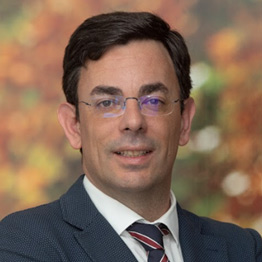
Martiño Rodríguez González
mrgonzalez@unav.es
group "Education of affectivity and human sexuality".
The Task Force
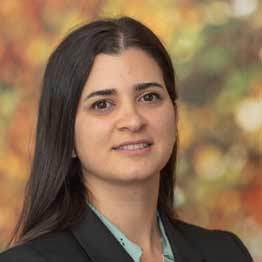
María de los Ángeles Cueli
Institute for Culture and Society

Victoria Nieuwenhuys
Institute for Culture and Society

contact:
Team of research
→ Gonzalo Arrondo
Institute for Culture and Society
→ Maria Calatrava
Institute for Culture and Society
→ Giulia Testa
International University of La Rioja
